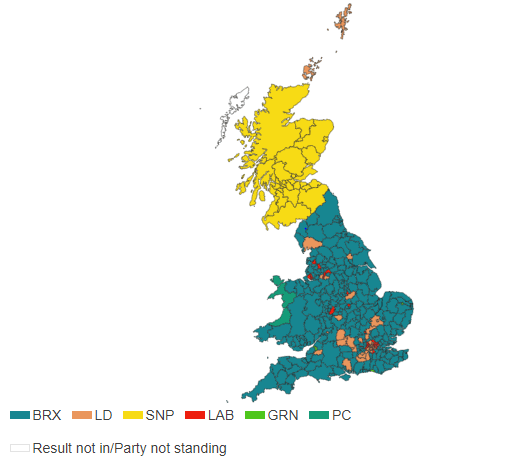The results of the European Parliament Elections in the UK confirm what was already well known: Theresa May´s attempts to deliver a version of Brexit which could pass in Parliament while holding together her party had failed. However, the results will still be pored over as experts try to predict the effect on Brexit and have politicians spinning the results to their benefit. But how much can we actually learn from the elections that the UK was never supposed to have?
The March of the Brexit Party
Newcomers, the Brexit party have eclipsed UKIP, the former lead cheerleaders for Brexit, who have lost all of their seats as they tacked towards the Islamophobic far-right. They have gained over 30% of the vote, winning across almost the whole of England and Wales. This suggests that they have taken significant numbers of Tory, and some Labour voters, in addition to almost all of UKIP’s. The simplicity of the party’s message explains much of their success. They have no manifesto and only one policy – to deliver Brexit.
Had Theresa May not already announced her resignation as Prime Minister, these results would likely have pushed her into doing so. As with UKIP’s success in 2014, the primary effect of this surge will now be to push the Conservative Party to the right as they seek to head off any threat to their base in a general election. Combined with the fact that the Conservative membership is fully committed to pursuing a no deal exit, this means that the next Tory leader and Prime Minister is almost guaranteed to be a full-throated no deal advocate. Indeed, we have already seen senior Tories, including some former remain supporters, coming out to push for a no deal Brexit in October.
These terrible election results are not a surprise. It’s because of the failure to leave the EU when we said we would. We must leave by 31st October deal or no deal. #EuropeanElectionResults
— Liz Truss (@trussliz) May 27, 2019
That said, there are enough senior Tory politicians opposed to the negative economic consequences of no deal who could attempt to prevent the new Prime Minister from forcing it through.
Brexit vote surpassed by Remain gains
While the Brexit Party has benefitted from being a single party with only one policy, the more fragmented pro-remain side has also done well. In fact, adding up the votes of the parties who are in favour of a second referendum with remaining in the EU as an option gives this position more support than Brexit. In England, the combined vote of the resurgent Lib Dems, the Greens (who have done well across Europe) and Change UK is over 40%, while Brexit and UKIP together make up around 36%. The Scottish National Party have also increased their vote share while promising to oppose Brexit, while Plaid Cymru have beaten Labour to take second place in Wales. So while the Brexit Party have made an eye-catching entry into British electoral politics the solidification of the pro-Remain vote disproves the argument that there is a clear majority in favour of Brexit at all costs, and suggests that a second referendum may have a different result from the first. If we consider Labour voters as leaning towards remain and Conservative voters as leaning towards a hard Brexit, which fits with what opinion polls have shown over the last year, then we see a clear majority in favouring of cancelling Brexit and remaining in the EU. However, that, of course, comes with the caveat that turnout is less than half of what we saw in the 2016 referendum.

Meanwhile, it is unclear whether the increase in the SNP’s vote primarily reflects the drive for a 2nd Scottish independence referendum, a desire to remain in the EU or both. What is clear is that politics in Scotland continues to move away from that of England, and that constitutional issues certainly dominate political life north of the border no matter what the Brexit outcome is.
Labour losses
The Labour party have lost round 11%, less than the Tories 15% but still a dreadful result for an opposition party. This has led to them being beaten in their London stronghold by the pro-Remain Lib Dems while also losing votes in their traditional Northern heartlands. They have also fallen to 5th place in Scotland, another former stronghold which they must win back if they hope to form a majority government. The fact that both of the main parties have lost seats and votes fits with a long-term trend towards political polarisation in Europe, with establishment parties of the centre being squeezed on both sides. However, it also shows how the failure to have a clear narrative has hurt both parties. The parties which gained on both the Leave and Remain sides are those which had clear messages. The Brexit Party, Lib Dems, Greens and the nationalist parties all had a clear narrative and policy going into the elections. It is those parties who pursued either a botched compromise or a position of “constructive ambiguity” who suffered. Senior Labour politicians appear to have now accepted that the time for sitting on the fence is over, with open calls for a second referendum. The result of this election is therefore that Labour will move towards the pro-Remain parties while the Conservatives side with the hard Brexit parties, with the centre-ground on Brexit being completely abandoned.
A Proxy Referendum?
This election will be interpreted by some as a proxy referendum. However, only 37% of voters participated, making it a poor replacement for a referendum by any measure. Furthermore, the 2 main parties do not have a clear position, making it hard to know where their voters stand. Labour and the Tories took almost 25% of the vote, but their own voters are incredibly divided. If we compare the vote of hard Brexit parties to the unambiguously pro-Remain parties then we can see a situation which reaffirms what polls have been telling us: the British public are still divided on the issue of Europe.
Reading the tea leaves
Since the referendum, it has been the job of politicians to interpret ambiguous results into actionable policy. While the original referendum result was clear enough, with a simple Yes or No question, how this could translate into government policy was unclear. People were asked to give a yes or no answer to a multifaceted question. Did a remain vote mean remain and reform, or was it a green light for further federalism? Was a leave vote supposed to show support for moving to an easy, smooth trading relationship as many prominent leave campaigners seemed to suggest was possible? Or was it a vote for a hard Brexit. And what was the timeline supposed to be? None of the questions could be asked in the referendum, and the truth is that voters expectations existed along a broad spectrum. This meant that it was up to Theresa May to interpret the result, which she did with disastrous consequences. Furthermore, the nature of entering into international negotiations means that even if she had correctly interpreted the will of the people, she would be relying on the EU to facilitate her policy. The referendum result was impossible to read, with many possible interpretations being impossible to deliver. As such, the clarity of the referendum question disguised a complex situation, which led to a process with an outcome that no one had voted for.
Image: Tristan MIMET from Pixabay
The views and opinions expressed in this article are those of the author and do not necessarily reflect the official policy or position of The Geopolitics.
About the Authors

Daniel Odin Shaw is a Ph.D. candidate at the University of Glasgow, focusing primarily on non-state actors and conflict resolution as well as extremist political movements. He has been published in Ms. Magazine Online, The Monthly Review and Global Politics.co.uk. He tweets at @DanielOdinShaw.


